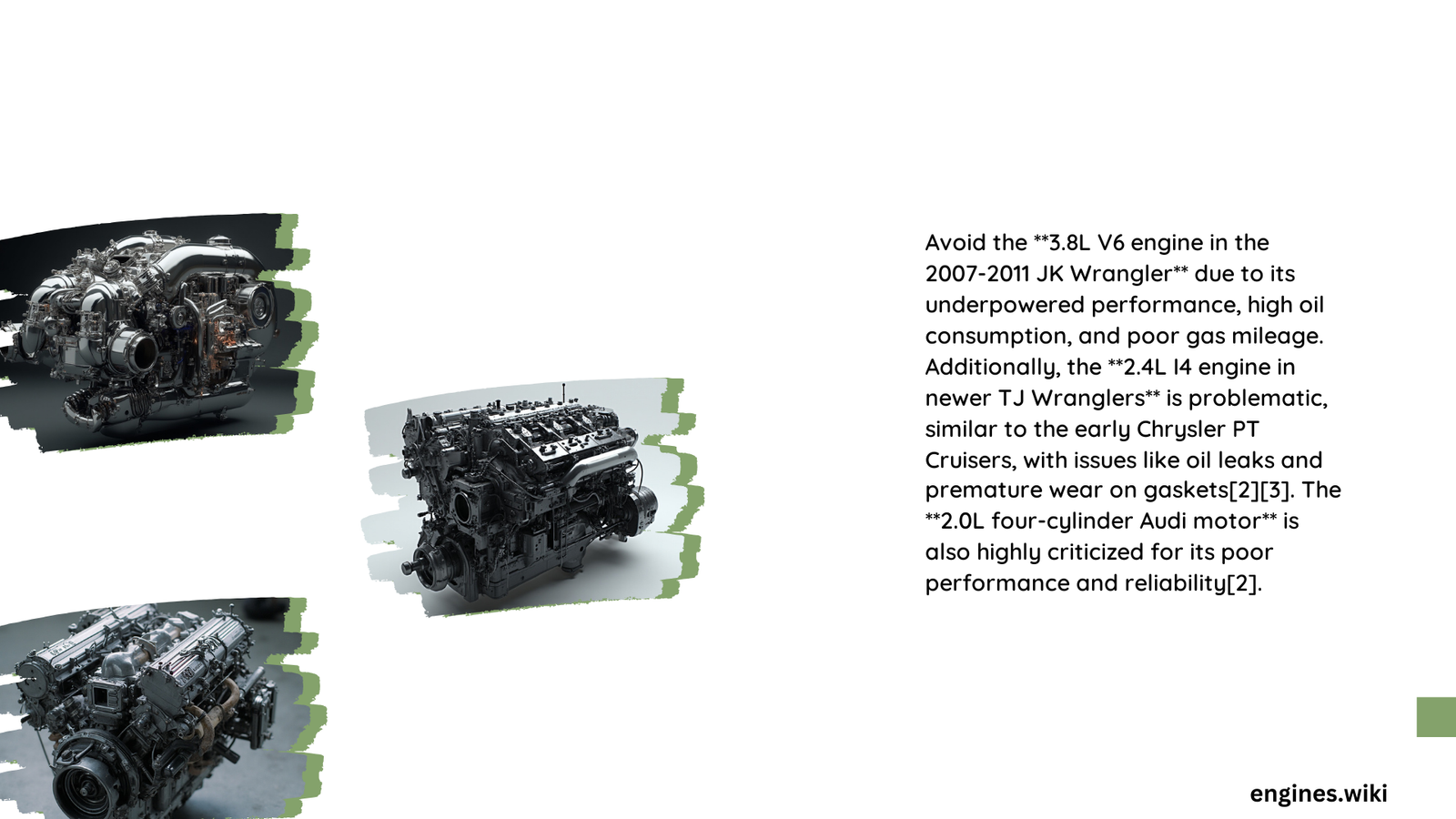What Jeep Engine to Avoid: A Comprehensive Performance Analysis
Critical Overview of Problematic Jeep Engines
Jeep owners and potential buyers must be cautious about specific engine models that have demonstrated consistent reliability issues. The most problematic engines include the 3.8L V6 in early Wrangler JK models, the 2.4L Tigershark in Cherokee, and the EcoDiesel engine in Grand Cherokee. These powertrains have exhibited significant mechanical problems ranging from excessive oil consumption to potential engine fires, making them critical engines to avoid when considering a Jeep purchase.
Why Do Some Jeep Engines Fail?
What Causes Jeep Engine Reliability Problems?
Several factors contribute to Jeep engine reliability issues:
- Manufacturing Defects
- Poor design tolerances
- Suboptimal material selection
-
Inadequate quality control processes
-
Common Mechanical Weaknesses
- Premature wear of critical components
- Oil consumption problems
- Cooling system vulnerabilities
Specific Jeep Engines to Avoid
| Engine Model | Vehicle | Primary Issues | Reliability Rating |
|---|---|---|---|
| 3.8L V6 | Wrangler JK (2007-2011) | High oil consumption, power loss | Low (2/10) |
| 2.4L Tigershark | Cherokee | Excessive oil consumption | Poor (3/10) |
| EcoDiesel | Grand Cherokee | Potential engine fire risk | Very Low (1/10) |
Detailed Engine Problem Analysis
What Makes the 3.8L V6 Problematic?
The 3.8L V6 engine in early Wrangler models suffered from multiple critical issues:
– Aggressive oil consumption rates
– Premature bearing wear
– Inconsistent power delivery
– High maintenance costs
Why Avoid the 2.4L Tigershark?
Cherokee owners reported significant problems with the 2.4L Tigershark engine:
– Rapid oil consumption
– Potential engine damage if not monitored
– Expensive repair costs
– Frequent dealer interventions required
What Risks Exist with EcoDiesel Engines?
The EcoDiesel engine in Grand Cherokee presented severe challenges:
– High risk of EGR cooler leaks
– Potential engine fire hazards
– Extensive recall history
– Substantial repair expenses
Prevention and Maintenance Strategies
How Can Jeep Owners Mitigate Engine Problems?
- Regular maintenance schedules
- Frequent oil level checks
- Immediate professional diagnosis of unusual symptoms
- Consider extended warranty coverage
- Research specific model year performance
Cost Implications
Average Annual Repair Costs:
– Wrangler: $694
– Grand Cherokee: $850
– Cherokee: $520
Expert Recommendations
Potential Jeep buyers should:
– Prioritize newer model years
– Verify complete service history
– Conduct thorough pre-purchase inspections
– Consider certified pre-owned vehicles with warranty
Technical Performance Metrics
Reliability Scores:
– Wrangler (2020+): 82/100
– Grand Cherokee (4th Gen): 45/100
– Cherokee: 52/100
Final Guidance
While some Jeep engines demonstrate reliability concerns, not all models are problematic. Careful research, maintenance, and informed purchasing decisions can help mitigate potential engine-related risks.

